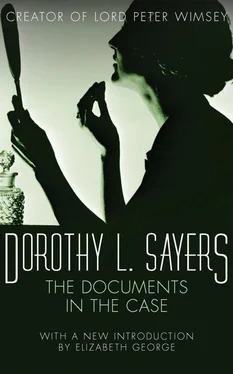Dearest Bungie,
Things are looking up. This Life will be finished by Christmas, I hope. I am rather stuck at present over the chapter on ‘Religious Convictions’. It is difficult to bring one’s mind into sympathy with that curious Victorian blend of materialism and trust in a personally interfering Providence. It’s odd how they seem to have blinded themselves to the hopeless contradiction between their science and their conventional ethics. On the one hand, an acceptance of the Darwinian survival of the fittest, which ought to have made them completely ruthless in theory and practice; on the other, a sort of sentimental humanitarianism, which directly led to our own special problem of the multitudinous survival of the unfittest. They seem to have had a pathetic belief that it could all be set right by machinery. I don’t know, come to think of it, that we are in a much better position today, except that we have lost the saving belief in machinery. Which doesn’t stop our becoming more and more mechanical, any more than their having lost their belief in anthropomorphism stopped them from becoming more and more humanitarian. Compromise — blessed word! — Chesterton speaks somewhere of the great Victorian compromise — but why Victorian, more than anything else? At any rate, they had the consolation of feeling that this earth and its affairs were extremely large and important — though why they should have thought so, when they were convinced they were only the mechanical outcome of a cast-iron law of evolution on a very three-by-four planet, whirling round a fifth-rate star in illimitable space, passes human comprehension. It would be more reasonable to think so today, if Eddington and those people are right in supposing that we are rather a freak sort of planet, with quite unusual facilities for being inhabited, and that space is a sort of cosy little thing which God could fold up and put in his pocket without our ever noticing the difference. Anyhow, if time and space and straightness and curliness and bigness and smallness are all relative, then we may just as well think ourselves important as not. ‘Important, unimportant — unimportant, important,’ as the King of Hearts said, trying to see which sounded best. So, like the Victorians, we shall no doubt compromise — say it is important when we have a magnum opus to present to an admiring creation, and unimportant when it suits our convenience to have our peccadilloes passed over.
Forgive me wandering away like this. It’s just a sort of talking the thing out with you before I talk it out in the book. Because, for some reason, it does seem to me important to do this job as well as I can — not merely because it will do me good with publishers, and make it possible to embark on the important triviality of marriage, but for some obscure and irrational motive connected with the development of my soul, if I may so allude to it. I am increasingly not clear whether I am a mess of oddly assorted chemicals (chiefly salt and water), or a kind of hypertrophied fish-egg, or an enormous, all-inclusive cosmos of solar-systematically revolving atoms, each one supporting planetfuls of solemn imbeciles like myself.
But, whatever I am, I must finish the Life and then get on to our life, Bungie, because that somehow does count for something too.Jack
9. The Same to the Same
15a, Whittington Terrace, Bayswater 15th October, 1928
I knew it, Bungie — I knew it, I knew it! I knew we should be asked downstairs to tea. And we’ve been! Down among the Liberty curtains and the brass Benares ware! Three young women, two bright youths, the local parson and the family. Crockery from Heal’s and everything too conscientiously bright. Mrs Harrison all radiance and very much the centre of attraction.
No sooner had I got there than I was swept into a discussion about ‘this wonderful man Einstein’. Extraordinarily interesting, wasn’t it, and what did I make of it? Displaying all my social charm, I said I thought it was a delightful idea. I liked thinking that all the straight lines were really curly, and only wished I’d known all about it at school, because it would have annoyed the geometry master so much.
‘But you do think there’s something in it, don’t you? My husband says it is all nonsense, but what do you say?’
There was a little stir of triumph about this, and I somehow gathered that the Einstein topic had been deliberately chosen for a purpose. I said guardedly that I believed the theory was now generally accepted by mathematicians, though with very many reserves.
‘It really is, is it? Really true that nothing actually exists as we see it? I do hope so, because I have always felt so strongly that materialism is all wrong. There is something so deadening about materialism, isn’t there? I do so wish I knew what life means and what we really are. But I can’t understand these things, and you know, I should so like to, if only I had someone to explain them to me.’
‘As far as I can make out,’ I replied, you are really only made up of large lumps of space, loosely tied together with electricity. It doesn’t sound flattering, but there it is.’
She frowned attractively.
‘But I can’t believe that.’
‘Why do you want to believe it?’ said Harrison. ‘It’s all words. When it comes to doing anything practical you have to come back to common sense. My friend Professor Alcock—’
‘Yes, yes, I know.’ She waved the interruption aside impatiently. ‘But the idea is the real thing, isn’t it? Haven’t they come round to thinking that poetry and imagination and the beautiful things of the mind are the only true realities after all?’
‘Of course beauty is the only true reality,’ said Lathom eagerly. ‘But it isn’t always what ordinary people think of as beauty. I mean, it’s not pretty-pretty. When you think a thing, then you create it and it exists. What’s the use of arguing what you make it of? That doesn’t matter to the thing itself, any more than the stuff paints are made of matter to the picture.’
‘It matters a good deal in practice,’ said Harrison. ‘Now the Pre-Raphaelites understood that — though, mind you, I don’t think much of the Pre-Raphaelite school myself. Some of their pictures are so remarkably ugly, and so exaggerated in colour. Take that thing of Holman Hunt’s, now—’
‘Darling,’ said Mrs Harrison, with emphasis, ‘you’re side-tracking.’
‘No, I’m not. I’m coming back to that. What I mean is that the Pre-Raphaelites, especially William Morris, knew a great deal about the material of their paints. They used to get the right stuff and grind it themselves, so as to be sure it wasn’t adulterated. Now I’m all of their opinion. I say they were quite right. I get my colours from a man up in town, a wholesale dealer—’
‘My husband is always so literal,’ said Mrs Harrison, taking the whole company into a confederacy to condemn the unfortunate man. ‘But I didn’t mean that at all. Mr Lathom understands what I mean — don’t you, Mr Lathom?’
‘Yes,’ said Lathom, ‘and, of course, it’s true in a way. But you mustn’t think that the form of the thing doesn’t matter, too. Whatever the world is made of, there it is, and it’s ours to make something of.’
‘It must be marvellous to paint great pictures!’ said one of the young women.
Lathom scowled frightfully, and, ostentatiously ignoring her, continued his remarks to Mrs Harrison in an undertone.
What a conversation, my God! Harrison faded out and I don’t blame him, and I took the opportunity to tackle the parson, a fellow by the name of Perry. He turned out to be an earnest and cultivated middle-aged spike from Keble, and I took the opportunity to mention the Life and the difficulties about Victorian materialism.
Читать дальше












